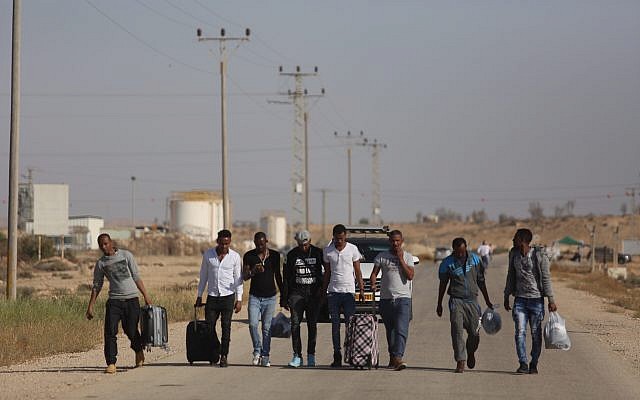A month after he cancelled it, Prime Minister Benjamin Netanyahu’s office has reportedly resumed contacts with the UN’s refugee agency on a deal that would see thousands of African migrants resettled in the West and thousands more given temporary status in Israel.
Hours after announcing this “best possible” deal, however, Netanyahu froze and then scrapped it, amid pressure from political hawks and others opposed to the notion of 16,500 of the migrants being absorbed by Israel.

Israel then sought to find a country willing to take in even forcibly deported migrants, many of them from Sudan and Eritrea, sending an envoy to Uganda and reportedly negotiating with Rwanda, to no avail. Last week, the state told the High Court that it was canceling plans for any forced deportations since it had been unable to find a recipient country.
Wednesday night’s TV report said the Prime Minister’s Office wants the UN to arrange the resettlement of a larger number of the migrants, and to do so more quickly than in the original five-year plan. It said the National Security Council in the PMO was handling the issue. The Prime Minister’s Office refused to comment on the report.
The UNHCR has been urging Israel to reconsider the scrapped deal, and has said it remains on the table.

“Every year I make thousands of decisions benefiting the State of Israel and Israeli citizens. Occasionally a decision is reached that has to be reconsidered,” Netanyahu said when scrapping the deal on April 3, speaking at a meeting with anti-migrant activists from south Tel Aviv, where many of the migrants reside.
Netanyahu said that after consulting with activist leaders, as well as with Interior Minister Aryeh Deri, “I have decided to cancel the agreement. Despite the mounting legal and international limitations, we will continue to act with determination to exhaust all of the options at our disposal for expelling the infiltrators.”
The previous afternoon, at a press conference alongside Deri, Netanyahu had praised the plan. “This agreement will allow for the departure from Israel of 16,250 migrants to developed countries like Canada or Germany or Italy,” Netanyahu declared. Other reports said the United States and Sweden would take in some of the number.
Netanyahu said at that press conference that an earlier plan to deport migrants to Rwanda and Uganda was no longer feasible. He stressed that “legal constraints as well as political difficulties on the part of [Uganda and Rwanda]” led to the cancellation of previous deportation policies.
Under the UN agreement, the asylum seekers who remained in Israel were to be dispersed in areas across the country outside of south Tel Aviv. Netanyahu vowed to prioritize rehabilitating the neighborhoods of south Tel Aviv, alongside implementing the international agreement.
In a Facebook video following up on his press statement, Netanyahu said that the migrants who would be allowed to stay in the country would be removed from Tel Aviv and sent to kibbutzim, agricultural villages and other communities.






